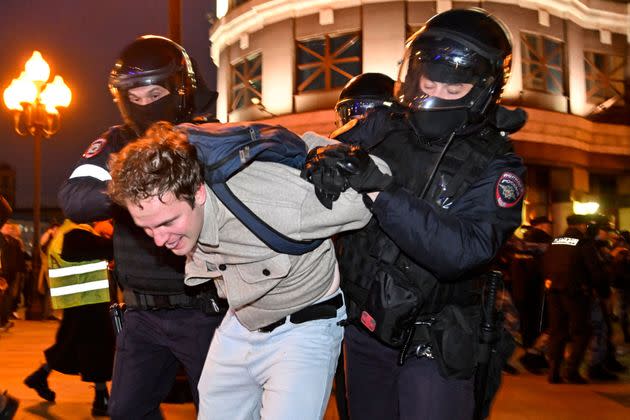Putin's Hastily Mobilised Troops Will Suffer 'High Attrition Rate', Western Officials Warn

Police detain a man in Moscow on September 21 following calls to protest against partial mobilisation. (Photo: ALEXANDER NEMENOV via Getty Images)
Vladimir Putin’s hastily mobilised troops will likely suffer a “high attrition rate”, western officials have warned.
The initial tranches of men called up under Russia’s “partial mobilisation” have started arriving at military bases, according to the UK’s ministry of defence.
They said many “tens of thousands” of call-up papers have already been issued to civilians.
Putin has vowed to draft an extra 300,000 men to fight in his war in Ukraine.
However, the move has sparked large scale protests - which are banned under Russian law - with more than 1,000 people detained.
The MoD said Russia was facing an “administrative and logistical challenge” to provide training for the new troops.
“Unlike most Western armies, the Russian military provides low-level, initial training to soldiers within their designated operational units, rather than in dedicated training establishments,” they said.
Many of the drafted troops will deploy to the front line with minimal relevant preparation.Ministry of Defence
Usually one battalion in each Russian brigade remains in garrison while the other two deploy so they can provide a cadre of instructors to train new recruits or augmentees.
However, the MoD said Russia had deployed many of these third battalions to Ukraine.
“Many of the drafted troops will not have had any military experience for some years,” they added.
“The lack of military trainers, and the haste with which Russia has started the mobilisation, suggests that many of the drafted troops will deploy to the front line with minimal relevant preparation. They are likely to suffer a high attrition rate.”
Putin’s foreign minister said on Sunday that annexed areas of Ukraine would be protected like Russian territory.

Police officers detain a man in Saint Petersburg on September 24 following calls to protest against the partial mobilisation. (Photo: - via Getty Images)
Referendums in those areas are ongoing, with Ukrainians under pressure from armed Moscow forces to cast their ballots.
Over the weekend, US officials said Russia was showing signs of “struggling” in its war against Ukraine, evidenced by Putin’slatest nuclear threats.
White House National Security Adviser Jake Sullivan told ABC: “What you see inside Russia right now, this call-up of troops, the sham referenda that they’re trying to run in the occupied territories - these are definitely not signs of strength or confidence.
“Quite the opposite: They’re signs that Russia and Putin are struggling badly.”
This article originally appeared on HuffPost UK and has been updated.

